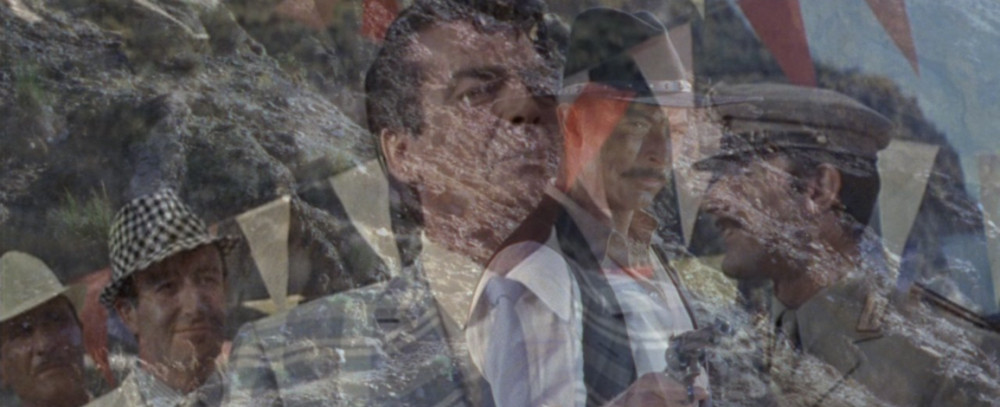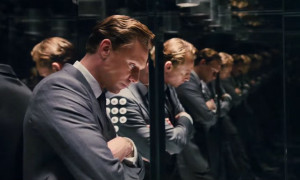
Hi, I’m Salim Garami. Almost certainly none of you will know me by my own writing at Movie Motorbreath (my personal movie blog) or Panel & Frame. But I figured I’d take care to introduce myself–Juan and Derek invited me to write this piece for them and so I figured a bit of guest self-advertising doesn’t hurt.
In the meantime, the latest match-up in Dim the House Lights’ 1966 Tournament of Films. And whoopee, the films I’ve been assigned with are ones I am very excited to announce were first time viewings for me. This made me excited until I also discovered how painfully hard it was to find a copy to view here in Miami (for instance, The Big Gundown didn’t receive a US home video release until 3 years ago–even then, the cut we Yanks got was severely cut down from the Italian release), though not impossible. In the first corner, we have the British-Italian comedy After the Fox, directed by the neorealist figure of Vittorio De Sica. But we’re a far ways from Bicycle Thieves and Umberto D., as After the Fox‘s screenplay by juggernaut playwright Neil Simon and frequent De Sica collaborator Cesare Zavattini follows the grand escapade of Aldo “The Fox” Vanucci (Peter Sellers), a criminal mastermind currently relaxing in a prison of his own accord with a contract smuggling gold bullion out of Cairo waiting for him whenever he wishes to return to the profession. His only real drive into taking the job comes from when he discovers that his beloved younger sister Gina (Britt Ekland) has begun fancying men. Vanucci’s involvement leads to a longer con where he poses as a big-shot Italian director (because it’s not a Sellers performance without his complex brilliance in portraying roles within roles) and using his manufactured clout to con a village on the Italian coast into being involved in his latest film production while using that production as a front to smuggle the gold from Cairo with the help of his accomplices Okra (Akim Tamiroff) and Okra’s sister (Maria Grazia Buccella).
Keep in mind those names dropped: De Sica (who has proven long before After the Fox to be capable of some real belly-busters like Yesterday, Today, and Tomorrow and Marriage Italian Style). Sellers (brilliant chameleon of parody operating in a caper film, which is pretty much home territory for any British comic). Simon. There’s no possible way After the Fox could lose the prize tonight, could it?
Enter The Big Gundown. A spaghetti western distinct in that it is not directed by spaghetti western giants Sergio Leone or Sergio Corbucci, but still containing a lot of that Leone DNA within it. To begin with, it is written by Sergio Donati, who would later write Once Upon a Time in the West and A Fistful of Dynamite (it was in fact Leone who convinced him to pursue screenwriting). Then there’s the fact that the star of the film is that one face of the greatest of the Leone pictures, Clint Eli Gian Lee Van Cleef. OK, not the first face one might think of with Leone pictures, but it is probably more so the case that I can’t think of Lee Van Cleef without thinking of his calm cruel cool that made up his characters within For a Few Dollars More and The Good, the Bad, and the Ugly. Director Sergio Sollima had much more to worry about beyond the elements of construction The Big Gundown shares with Leone. While The Big Gundown is by no means a failure, it happened to be released in the shadow of The Good, the Bad, and the Ugly and Django, sealing its fate as the “other other spaghetti western of 1966.”
But what about what The Big Gundown is about? Van Cleef plays Jonathan Corbett, a bounty hunter on the edge of retirement and heavily considering a run for a seat in the Senate, especially with the keen encouragement of railroad baron Brockston (former Philadelphia Eagles lineman Walter Barnes). When the wedding of Brockston’s daughter is interrupted with the news of the rape and murder of a 12-year-old girl by the Mexican outlaw “Cuchillo” Sanchez (Tomas Milian), Corbett offers to take the final job as a wedding gift to Brockston. However, Cuchillo proves to be craftier than one would expect and Brockston eventually becomes impatient and signs on a second gunman, Baron von Schulenberg, with license to terminate Cuchillo and possibly Corbett himself complicating the matters.
So we have two genre pieces in the ring–one an Italian comedy, the other an Italian spaghetti western. Both of them with some of the most solid names in the genre (I neglected to mention Burt Bacharach scores After the Fox while, of course, Ennio Morricone scores The Big Gundown–meaning that both films had the finest, most overt scores of their genre that they possibly could have hoped to have). All with ingredients that promise the best possible outcome of either project.
Well, dear readers, the sad truth about both of these movies is simply that, while I didn’t find myself disliking either of them, I was not terribly impressed with them either. They’re nowhere near the top-tier entries in either career in my eye, nor are they top-tier within their respective genres. Of course, one of these films as least functions much more effectively than the other.
With After the Fox, we have ourselves a great, sprawling, convoluted scenario that should have been illustrated by my word salad of a synopsis. That doesn’t necessarily downgrade its status as a wacky comedy, but at the same time, the frantic mania that makes up the movie’s entire pace means that we might want to pick up enough about the film to at least give the gags some amount of gravity. After the Fox doesn’t seem to consider this a huge concern. It instead tries to play out its potential as a Peter Sellers vehicle more than anything (including various improvisations with his then-wife Ekland) and, while Sellers is undoubtedly best in show by all means with all those great Simon lines (“If only I could steal enough money to become an honest man” is my favorite), Sellers is not giving us any true revelation of a performance. Truth be told, it’s all a lesser version of his work in The Pink Panther, no longer with the uniqueness of that original film. It carries the movie by all means, but it doesn’t elevate it.
It is, by all means, the most vain of projects for Sellers and that sort of self-centeredness puts me off of the film. It also doesn’t help that halfway through, the movie begins trying to sell itself as a criticism of moviemaking and the industry (with various overt jabs such as the title of the fake production The Gold of Cairo obviously being De Sica winking at his own The Gold of Naples or the false identity of the Fox being Federico Fabrizi), but its commentary never goes much farther than “famous people can get away with stuff” and it seems of little consequence to the main plot and vice versa. After the Fox has too much of a weak foundation to take this win; all The Big Gundown has to do is be a good movie.
And The Big Gundown is a good movie. A good movie I don’t find myself ever watching again, but a good movie nonetheless. Van Cleef and Milian make a great pack of foils, with Milian sucking up all the energy the stoic Van Cleef refuses to exert. The cinematography by Carlo Carlini is not particularly imaginative, though it scrounges up as many colors as possible to give this spaghetti western the feeling of a fable. Which is a smart move when one considers how politically charged The Big Gundown is as a depiction of classism and division (something in Sollima’s other spaghetti westerns as well). It’s a brisk and effective enough picture to zoom right into not one but two climaxes and not have one undermine the other. Of course, it’s by no means perfect–Corbett as a character has a lot of logical inconsistencies to put him several steps behind Cuchillo just to keep the story moving and, while I need to keep in mind that there are multiple edits of the film, I have the biggest ache in my body that Ennio Morricone’s work was viciously chopped down and that means the guttural emotions of the music are cut off way too often.
Still The Big Gundown felt more accomplished as a viewing to me than After the Fox, and it left me with little doubt about what I’d give this round to. When in doubt, go with the spaghetti western. I really hope The Big Gundown meets up with Django or The Good, the Bad, the Ugly, but I’m pretty cruel like that.
The winner: The Big Gundown
—
Both films are available for purchase or rent on home video. I’m serious, though, when I say finding these movies was a mission. Godspeed to you all.
After the Fox; directed by Vittorio De Sica; written by Neil Simon and Cesare Zavattani; starring Peter Sellers, Britt Ekland, Lydia Brazzi, Paolo Stoppa, Victor Mature, and Tino Buazzelli, 103 minutes.
The Big Gundown; directed by Sergio Sollima; written by Sergio Donati and Sergio Sollima; starring Lee Van Cleef, Tomas Milian, Walter Barnes, Nieves Navarro, Gerard Herter, and Fernando Sancho; 95 minutes (US home video)/89 minutes (US theatrical)/110 minutes (Italy).



 Derek
Derek
 Isabelle
Isabelle